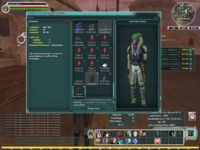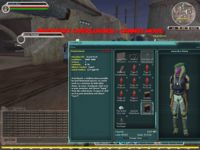Difference between revisions of "Containers (Game Mechanics)"
(→Game Mechanics) |
(→Game Mechanics) |
||
| Line 43: | Line 43: | ||
When you open a container, you will see a container window. This window shows you the contents of the container. You can pick things out from the container and drag them into another container or into your inventory or use the Pickup radial on the object inside the container to automatically obtain the item. A player may not however place items inside an npc corpse or world object. | When you open a container, you will see a container window. This window shows you the contents of the container. You can pick things out from the container and drag them into another container or into your inventory or use the Pickup radial on the object inside the container to automatically obtain the item. A player may not however place items inside an npc corpse or world object. | ||
| + | |||
| + | |||
| + | == Container Types | ||
There are basically 11 types of containers: | There are basically 11 types of containers: | ||
| − | + | Mob Corpses/player inventory | |
| + | |||
| + | |||
| + | World Container Objects: | ||
| + | |||
| + | These include static and spawned object locations such as drums, loose debris, pile of bones, treasure boxes, and mag seal containers. (20 items, unverified) | ||
| + | |||
| + | |||
| + | Lootable and quest aquired Containers such as: | ||
| + | |||
| + | satchels, locked containers, and cargo pockets (20 items); mercenary, two-strap and multipocket bandoliers (50 items) Note: Ithorians have a version of the bandoliers themselves. | ||
| − | + | Player Crafted backpacks. (50 Items) | |
| + | Player Crafted Component analysis tools (holds 10 looted ship component items) | ||
| − | |||
| − | + | All player crafted furnitures: | |
| − | + | chests, cabinests, armoires, book cases, and toolchests are containers that can store up to 50 items each. The items in the container do count towards your housing inventory. | |
| − | + | Crafting station and crafting tool hoppers. (Holds 100 items and Contents count against housing limit) | |
| − | + | Bank Safety Deposit boxes. These hold 100 items, and allow other containers to be placed inside. | |
| − | + | Fish - These have a storage capacity of 5. Note: Fish storage capacity works similar to world containers in that a player may only remove items from it, and may not open it or add items back into them. | |
| − | + | Treasure Chests | |
| − | + | These have a storage capacity of 20. Note: Treasure Chest capacity works similar to world containers in that a player may only open and remove items from it, and may not add items back into them. | |
| − | + | Fireworks Show Package - These containers have a capacity to hold 20 fire work items. These work similar to Starship Component Analyzer Tools in that items are stored inside, however with one important exception. Fireworks are added into the show package via radial menu prompt and in this process they are added to the stack size of the fireworks show package but are not counted towards the player's inventory nor other content container/housing item limits. This indicates that fire work show packages may not be 'real' containers but are none the less listed as such. | |
Revision as of 03:14, 6 September 2009
| This article or section needs proper wiki formatting. |
Game Mechanics - Mechanics Category
SWGANH Wiki is a repository of Star Wars Galaxies Developer information. This site is only meant to be used by SWGANH Developer team.
Game MechanicsSome objects are containers, and one of the choices on the radial menu will be "Open". (If it's an NPC's corpse, the option will be called "Loot" instead, but it means the same thing). When you open a container, you will see a container window. This window shows you the contents of the container. You can pick things out from the container and drag them into another container or into your inventory or use the Pickup radial on the object inside the container to automatically obtain the item. A player may not however place items inside an npc corpse or world object.
Mob Corpses/player inventory
These include static and spawned object locations such as drums, loose debris, pile of bones, treasure boxes, and mag seal containers. (20 items, unverified)
satchels, locked containers, and cargo pockets (20 items); mercenary, two-strap and multipocket bandoliers (50 items) Note: Ithorians have a version of the bandoliers themselves.
Player Crafted Component analysis tools (holds 10 looted ship component items)
chests, cabinests, armoires, book cases, and toolchests are containers that can store up to 50 items each. The items in the container do count towards your housing inventory. Crafting station and crafting tool hoppers. (Holds 100 items and Contents count against housing limit) Bank Safety Deposit boxes. These hold 100 items, and allow other containers to be placed inside. Fish - These have a storage capacity of 5. Note: Fish storage capacity works similar to world containers in that a player may only remove items from it, and may not open it or add items back into them. Treasure Chests These have a storage capacity of 20. Note: Treasure Chest capacity works similar to world containers in that a player may only open and remove items from it, and may not add items back into them. Fireworks Show Package - These containers have a capacity to hold 20 fire work items. These work similar to Starship Component Analyzer Tools in that items are stored inside, however with one important exception. Fireworks are added into the show package via radial menu prompt and in this process they are added to the stack size of the fireworks show package but are not counted towards the player's inventory nor other content container/housing item limits. This indicates that fire work show packages may not be 'real' containers but are none the less listed as such.
While these items do have their differences, there are some common aspects between them
2. To view nested contents, such as when crafting and accessing multiple containers in the craft window, an Open in New Window radial option appears when using a container in inventory for the player when they wish to access multiple container windows at once if there is already an open container being viewed. 3. Containers can not be placed inside other containers with the exception of bank deposit box, satchels, cargo pockets and the starship component analyzer tool. 20 item containers such as Satchels and Cargo Pockets may be placed inside higher level containers such as backpacks, bookcases etc but may not be placed inside other satchels and cargo pockets. Any non data item may be placed inside a container. 4. Container Volumn attributes indicate the current amount of objects within the container. This attribute is viewable by using the examine radial on any object that can be targeted. Every object by default has a volumn amount of 1, being itself. Any other object that is placed into it or that it holds, adds to this amount. Backpacks are a clear example of this. A backpack with 45 objects will have a volumn count of 46 (45 objects and itself). A backpack with no objects in it will have a volumn count of 1.
Source References
|

